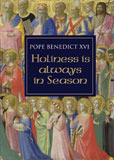On the "riches and merits" of St. Bernard of Clairvaux's theology
From Pope Benedict XVI's August 20, 2006, Angelus address, focused on the life of St. Bernard of Clairvaux, Doctor of the Church, whose feast is celebrated on this date:
The riches and merits of his theology do not lie in having taken new paths, but rather in being able to propose the truths of the faith in a style so clear and incisive that it fascinated those listening and prepared their souls for recollection and prayer. In every one of his writings, one senses the echo of a rich interior experience, which he succeeded in communicating to others with a surprising capacity for persuasion.
For him, love is the greatest strength of the spiritual life. God, who is love, creates man out of love and out of love redeems him. The salvation of all human beings, mortally wounded by original sin and burdened by personal sins, consists in being firmly attached to divine love which was fully revealed to us in Christ Crucified and Risen.
In his love, God heals our will and our sick understanding, raising them to the highest degree of union with him, that is, to holiness and mystical union. St Bernard deals with this, among other things, in his brief but substantial Liber de Diligendo Deo. 
There is then another writing of his that I would like to point out, De Consideratione, addressed to Pope Eugene III. Here, in this very personal book, the dominant theme is the importance of inner recollection - and he tells this to the Pope -, an essential element of piety.
It is necessary, the Saint observes, to beware of the dangers of excessive activity whatever one's condition and office, because, as he said to the Pope of that time and to all Popes, to all of us, many occupations frequently lead to "hardness of heart", "they are none other than suffering of spirit, loss of understanding, dispersion of grace" (II, 3).
This warning applies to every kind of occupation, even those inherent in the government of the Church. In this regard, Bernard addresses provocative words to the Pontiff, a former disciple of his at Clairvaux: "See", he writes, "where these accursed occupations can lead you, if you continue to lose yourself in them... without leaving anything of yourself to yourself" (ibid).
How useful this appeal to the primacy of prayer and contemplation is also for us! May we too be helped to put this into practice in our lives by St Bernard, who knew how to harmonize the monk's aspiration to the solitude and tranquillity of the cloister with the pressing needs of important and complex missions at the service of the Church.
The full address, along with numerous others, is included in the recently published collection, Holiness Is Always in Season (Ignatius Press).
Carl E. Olson's Blog
- Carl E. Olson's profile
- 20 followers



